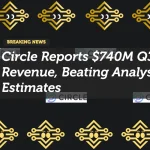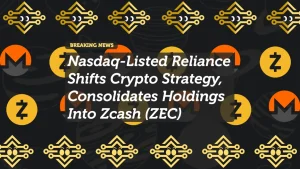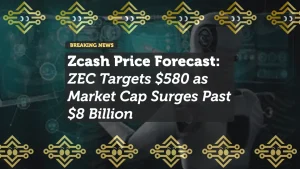
Zcash, Monero Lead Privacy Coin Rally as Investors Flock to Anonymity-Focused Crypto
The crypto market is witnessing a dramatic resurgence in privacy-focused digital assets.
Zcash (ZEC) and Monero (XMR) have both soared over 25% in the past week, leading a broader rally among anonymity-driven blockchain projects like Dero (DERO), Firo (FIRO), and Railgun (RAIL).
The renewed investor enthusiasm follows a wave of regulatory developments in the United States, Europe, and Asia — where increased blockchain surveillance and KYC mandates have sparked a counter-movement toward decentralized privacy layers.
“We’re seeing capital rotation from transparent Layer-1s to privacy-enhancing ecosystems,”
said Evelyn Pierce, analyst at Messari Crypto.
“Investors are positioning for the next era of permissionless finance — one where privacy is not a feature, but a necessity.”
Zcash (ZEC) Leads the Pack
Zcash has been the biggest winner of the week, climbing from $390 to over $500, marking a 28% rally as daily volumes surged above $2.1 billion.
The move follows news of the Zcash Network Upgrade 6 (NU6), which enhances shielded transaction scalability and introduces native cross-chain messaging.
Market analysts point to two main catalysts behind ZEC’s performance:
- Increased institutional interest after a report from Galaxy Digital Research, which classified Zcash as “the most institutionally viable privacy asset.”
- Growing retail awareness due to rising on-chain fees on Ethereum and Solana, which make privacy-enabled transfers comparatively cheaper.
“ZEC’s on-chain privacy now costs less than a basic ETH transfer,” noted James Dalton, trader at Wintermute.
“That’s an underrated advantage in a market focused on efficiency and security.”
Monero (XMR) Recovers Strongly After Regulatory Setbacks
Monero (XMR) — long considered the flagship privacy coin — rebounded to $245, up 18% week-over-week, after months of sideways trading.
The surge coincides with renewed developer activity and the rollout of the “Haven 2.0” wallet update, which integrates view key encryption and multi-signature enhancements to improve usability.
Despite delistings from several centralized exchanges earlier this year, Monero continues to dominate peer-to-peer and decentralized exchanges (DEXs), particularly in regions like Eastern Europe and Latin America.
“Monero’s liquidity depth on decentralized venues has doubled since August,” said CryptoQuant analyst Igor Meshkov. “That tells us organic demand is replacing the dependency on centralized liquidity.”
Privacy Revival Extends Beyond Legacy Coins
The rally has also spilled over to next-generation privacy platforms like:
- Dero (DERO): Integrating smart contracts with private computation.
- Railgun (RAIL): Offering privacy layers for DeFi and NFTs on Ethereum and Arbitrum.
- Nocturne Labs: Preparing to launch a private execution layer for EVM chains, backed by Paradigm and a16z.
Together, these protocols have seen their total value locked (TVL) rise by over 42% in two weeks, signaling a broader revival in the privacy narrative that had faded during the 2022–2023 regulatory cycle.
Regulation: The Double-Edged Catalyst
The irony isn’t lost on market participants — the very regulations designed to “de-risk” crypto have fueled renewed interest in tools for financial privacy.
In late October, the EU’s AMLA task force proposed a bill to restrict fully anonymous crypto transactions above €500, triggering strong criticism from digital rights advocates. Meanwhile, in the United States, Treasury-led KYC frameworks have drawn backlash from crypto-native communities.
“Privacy coins are becoming a form of protest,”
said Leah Stein, head of strategy at BlockPrivacy Labs.
“They represent resistance to financial surveillance — something that transcends pure speculation.”
The Bigger Picture: Privacy as a Core Narrative for 2026
Analysts suggest that as AI surveillance, CBDC pilots, and chain analytics expand globally, demand for privacy-preserving blockchains will become structural rather than cyclical.
Data from Santiment shows that wallet creation for ZEC and XMR has reached a 12-month high, while Google search interest in “crypto privacy” and “anonymous transactions” has tripled since September.
With DeFi projects now integrating zk-SNARKs, MPC (Multi-Party Computation), and on-chain mixers, the privacy renaissance may be one of the defining trends heading into 2026.
Bottom Line
The sudden rally of Zcash, Monero, and emerging privacy protocols highlights a powerful shift in sentiment:
Investors are no longer just chasing yield — they’re chasing sovereignty.
If privacy continues to evolve into the next major crypto meta-theme, ZEC and XMR could reclaim their positions as not just relics of crypto’s past, but leaders in its next evolution.













